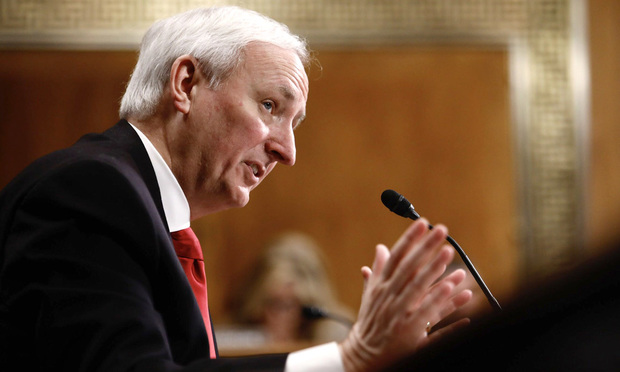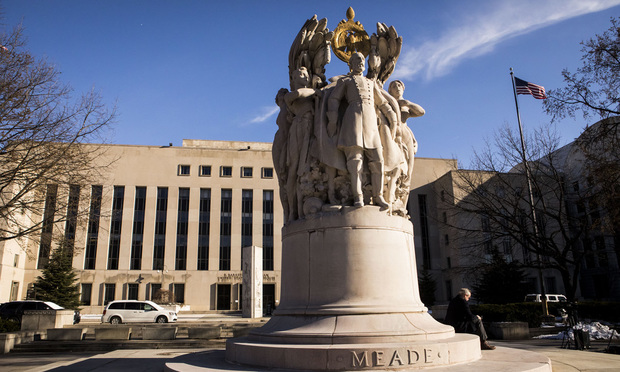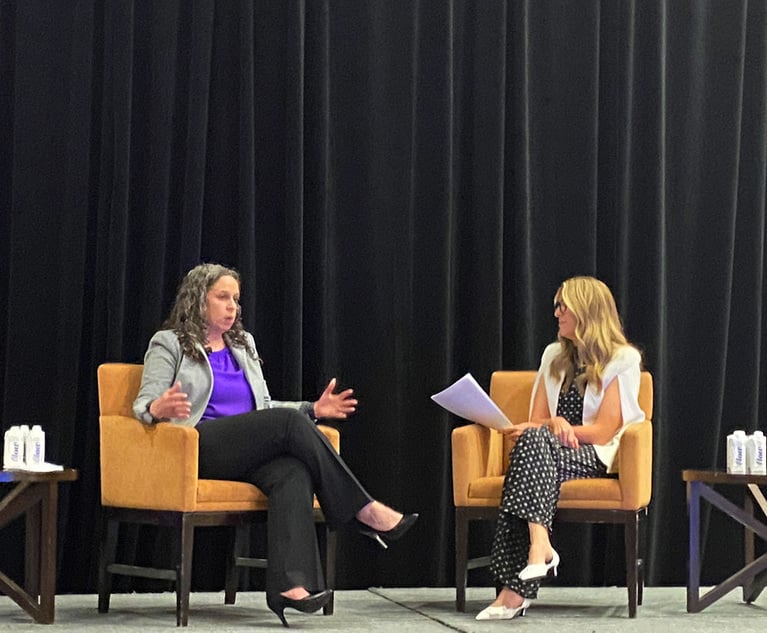Just before 8 p.m. Wednesday, the leader of the U.S. Justice Department’s civil division sent a staff-wide email with what was perhaps an inevitable message amid a pandemic: An employee was showing symptoms consistent with COVID-19, the respiratory illness associated with the novel coronavirus.
“The employee’s physician has recommended that the employee self-quarantine for two weeks,” Assistant Attorney General Jody Hunt wrote in the message, one of the first wide-scale acknowledgments of how coronavirus was affecting the U.S. Justice Department. The email’s importance was rated as “high.”
That evening and through the early hours of Thursday morning, a cleaning team worked to sanitize “potentially affected work areas” on four floors of the Liberty Square Building, a satellite office less than a half-mile from the Justice Department’s headquarters in downtown Washington. Hunt urged DOJ staff to consult their supervisors about teleworking if they considered themselves “at high risk for illness.”
The message, and others, came as other federal agencies were ramping up their response to the coronavirus outbreak. More broadly, the Trump administration, long a critic of telework, reportedly has been preparing a plan that would let hundreds of thousands of federal employees work remotely.
Deputy Attorney General Jeff Rosen sent a similar email Thursday evening encouraging supervisors employees across the Justice Department to consider teleworking. “We are all concerned about COVID-19 and want you to know we are monitoring our situation, and the department or various components will take appropriate measures, consistent with [Centers for Disease Control and Prevention] guidance, to address any circumstances that may arise,” Rosen wrote, in an email that included links to two CDC web pages.
 Jeffrey Rosen testifies before the Senate Judiciary Committee. Credit: Diego M. Radzinschi / ALM
Jeffrey Rosen testifies before the Senate Judiciary Committee. Credit: Diego M. Radzinschi / ALM
Inside the Justice Department headquarters, dispensers of hand sanitizer were prominently positioned on the first floor, with a sign instructing employees on proper handwashing techniques and other steps to avoid spreading germs.
Earlier in the week, the U.S. Securities and Exchange Commission asked employees to work from home, citing a potential case of coronavirus within the regulator’s ranks. The National Labor Relations Board is requiring mandatory telework at its main office in Washington at least through Monday.
“Agency leadership has advised employees that telework may be extended based on developing circumstances. In the meantime, a deep cleaning of all headquarters floors and common spaces, such as the elevators, will be undertaken,” the board said in a public advisory Thursday.
At the Federal Trade Commission, the agency’s leader addressed coronavirus in a staff-wide email Wednesday.
“I want to make one thing absolutely clear: liberal telework is currently available to ALL staff who wish to take advantage of it,” wrote FTC Chairman Joseph Simons, using red, boldface lettering to underscore his message. On Thursday, the FTC’s bureau of competition—the unit tasked with reviewing corporate mergers and acquisitions—said it was “actively recommending” telework, canceling non-essential travel and replacing in-person meetings with phone calls. The commission’s bureau of consumer protection sent a similar message to staff Friday afternoon, an FTC official said.
DOJ Clarifies Assertion That Staffers Had Contracted COVID-19
In one court case involving the federal government, there were signs of confusion within the Justice Department over whether any employees had contracted coronavirus, as new confirmed infections have ticked upward across the country.
The Justice Department on Friday took steps to clarify a letter that a DOJ lawyer sent on Wednesday to the U.S. Court of Appeals for the Fourth Circuit. The Richmond-based appeals court had asked attorneys in upcoming arguments—set for next week—to advise the court on any symptoms of the novel coronavirus and any broader exposure to individuals who have been infected.
A DOJ civil division lawyer, Kathryne Gray, who lives in Massachusetts and who is temporarily working there, had told the appeals court that “we recently discovered that Department of Justice attorneys in our office have tested positive for coronavirus upon return from their travel to and appearance in courts located in areas that have been heavy-hit with the virus.” Gray continued: “This has obviously raised concerns about official travel by air for court appearances.”
In a letter sent Friday, the Justice Department offered a correction.
“More accurately, we are aware of persons in our office in Washington, D.C., who have exhibited symptoms consistent with COVID-19 and have sought medical attention. We are not aware, as of this writing, of any positive test result for COVID19 within our office,” wrote Justice Department attorney Joshua Press.
The appeals court, responding to the DOJ letter sent earlier in the week, postponed argument in the case at least until May.
Gray’s letter asserted that “neither my co-counsel nor I am aware of any direct exposure to the coronavirus at the time of writing. We continue to receive new information with each passing day and, as a result, my representations are subject to change.”
The Fourth Circuit has been flooded with letters from government lawyers and private attorneys advising on any exposure to the novel coronavirus. In some cases, attorneys reported seasonal flu-like symptoms, but no lawyer who wrote to the court said they were infected with COVID-19.
The appeals court, like many others, was making plans this week to postpone some oral arguments, while other courts were curtailing public access to courthouses. On Friday, the Fourth Circuit said it was postponing arguments that had been set for March 17 to March 20.
The U.S. Supreme Court announced Thursday that the court’s iconic building in Washington, across from the U.S. Capitol, would close indefinitely to the public. By implication, the measure suggests the justices will prohibit the public from attending oral arguments upcoming later in March.
The Washington Post reported that as of Friday morning there were 11 confirmed coronavirus cases in the District of Columbia. Virginia had reported 18 confirmed cases, and 13 were reported in Maryland. Across the country, more than 1,600 people have contracted virus, and more than 40 people have died.
 E. Barrett Prettyman courthouse in Washington, D.C. March 22, 2018. Photo: Diego M. Radzinschi/ALM
E. Barrett Prettyman courthouse in Washington, D.C. March 22, 2018. Photo: Diego M. Radzinschi/ALM
The U.S. Court of Appeals for the D.C. Circuit on Friday issued a new advisory saying that any lawyer experiencing flu-like symptoms, or symptoms of COVID-19, should not attend court hearings. “Arguing attorneys are advised to limit the attendance of co-counsel and support staff at oral argument as much as possible. Please exercise caution to protect the health and well-being of your colleagues and court staff,” the advisory said.
Many courts across the country were embracing teleconferences for hearings. Next week’s Judicial Conference of the United States will be conducted by teleconference “due to concerns about the spread of COVID-19.”
Read more:
As Coronavirus Threat Grows, More Courts Curb Access and Limit Oral Arguments
At DC’s Federal Trial Court, Judges and Lawyers Grapple With Coronavirus Pandemic
We Navigated Crises. Here’s How to Prepare Your Business in the Coronavirus Era.
As Coronavirus Spreads, Some Courts Shutter, Others Carry On
Law School Supreme Court Moot Sessions Carry On in Virus Era
NOT FOR REPRINT
© 2024 ALM Global, LLC, All Rights Reserved. Request academic re-use from www.copyright.com. All other uses, submit a request to [email protected]. For more information visit Asset & Logo Licensing.


 U.S. Justice Department headquarters in Washington, D.C. Credit: ALM
U.S. Justice Department headquarters in Washington, D.C. Credit: ALM








